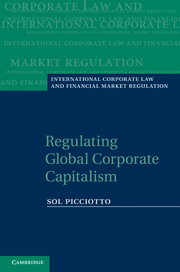Book contents
- Frontmatter
- Contents
- Preface
- Acknowledgements
- Table of cases
- Abbreviations and acronyms
- 1 Transformations of global governance
- 2 Liberal internationalism: strengths and limits
- 3 From interdependence to fragmentation
- 4 Corporations and competition
- 5 Corporate rights and responsibilities
- 6 International taxation
- 7 Regulation of international finance
- 8 The WTO as a node of global governance
- 9 Intellectual property rights
- 10 Law and legitimacy in networked governance
- Bibliography
- Index
1 - Transformations of global governance
Published online by Cambridge University Press: 05 June 2012
- Frontmatter
- Contents
- Preface
- Acknowledgements
- Table of cases
- Abbreviations and acronyms
- 1 Transformations of global governance
- 2 Liberal internationalism: strengths and limits
- 3 From interdependence to fragmentation
- 4 Corporations and competition
- 5 Corporate rights and responsibilities
- 6 International taxation
- 7 Regulation of international finance
- 8 The WTO as a node of global governance
- 9 Intellectual property rights
- 10 Law and legitimacy in networked governance
- Bibliography
- Index
Summary
The past few decades have seen major changes in the patterns and forms of international economic activity, and in their political, legal and institutional setting. The aim of this chapter is to outline the contours of these changes, to analyse and discuss the main concepts through which they might be grasped, and in that way to provide a basis for the more detailed studies in the succeeding chapters.
Globalization, regulation, legalization
Globalization or economic imperialism?
The transformations in global governance, and their contentious nature, have been debated through the concept of globalization, which became current especially in the 1990s. The controversies were partly due to the confusing character of the term. Perhaps inevitably for an abstract analytical concept, it was applied both descriptively and prescriptively. As description, the term globalization is unhelpful, since it implies a process of global unification, yet the world remains divided. Its use seemed to result from an abrupt awareness by some scholars and politicians that their assumptions and theories were too narrowly focused on the national state and economy, while failing to inquire whether such perspectives had ever been valid. While the critics of globalization were right to argue that the trends of the 1990s were part of a much longer history and that capitalism has always been global, too often such arguments led them to overlook or minimize the real changes taking place.
- Type
- Chapter
- Information
- Regulating Global Corporate Capitalism , pp. 1 - 24Publisher: Cambridge University PressPrint publication year: 2011



